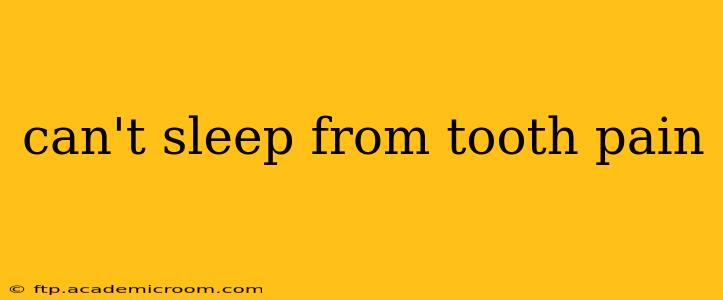Tooth pain is a terrible way to spend the night, leaving you tossing and turning instead of enjoying restful sleep. The throbbing ache, the sharp pangs – it's enough to drive anyone crazy. But don't despair! This comprehensive guide will explore various reasons why you might be experiencing tooth pain that's disrupting your sleep, and offer effective strategies to find relief so you can finally get some rest.
What Could Be Causing My Toothache That Keeps Me Up?
Several culprits can be behind your sleepless nights caused by tooth pain. Understanding the potential cause can help you determine the best course of action.
Cavities:
This is a common cause of tooth pain. Bacteria produce acids that erode tooth enamel, leading to cavities that can become infected and cause intense pain, especially at night when lying down increases blood flow to the area.
Abscessed Tooth:
An abscessed tooth is a serious infection at the root of the tooth. The pus buildup causes severe pain, swelling, and can even lead to fever. This is a medical emergency requiring immediate professional attention.
Gum Disease (Gingivitis/Periodontitis):
Inflammation and infection of the gums can cause pain, sensitivity, and bleeding. Neglecting gum disease can lead to more serious problems, including tooth loss.
Cracked or Broken Tooth:
A crack or fracture in a tooth, even a tiny one, can expose the sensitive dentin layer, resulting in sharp, shooting pains, especially when chewing or biting down.
Teeth Grinding (Bruxism):
Grinding your teeth, often unconsciously during sleep, can wear down enamel, leading to sensitivity and pain. This can also cause jaw pain and headaches.
Sinus Infection:
Sometimes, pain originating from a sinus infection can be mistaken for tooth pain, especially in the upper teeth. This is because the roots of the upper teeth are close to the sinuses.
Wisdom Teeth:
Impacted or partially erupted wisdom teeth can cause pain, swelling, and infection.
How Can I Get Relief From Tooth Pain Fast?
While professional dental care is crucial for long-term solutions, here are some ways to find temporary relief to help you sleep:
Over-the-Counter Pain Relievers:
Ibuprofen (Advil, Motrin) or acetaminophen (Tylenol) can help reduce pain and inflammation. Always follow the dosage instructions on the label.
Saltwater Rinse:
Dissolve a half-teaspoon of salt in a glass of warm water and gently rinse your mouth. This can help clean the area and reduce inflammation.
Cold Compress:
Applying a cold compress to the affected area can help numb the pain and reduce swelling.
Dental Floss:
If food is trapped between your teeth, gently remove it with dental floss. This can alleviate pressure and reduce pain.
Avoid Irritants:
Refrain from consuming hot, cold, acidic, or sugary foods and drinks, as these can exacerbate tooth sensitivity and pain.
When Should I See a Dentist Immediately?
Seek immediate dental attention if you experience:
- Severe, throbbing pain: This could indicate an abscess or other serious infection.
- Swelling of the face or jaw: This is a sign of a possible infection.
- High fever: This could be a sign of a severe infection.
- Difficulty opening your mouth: This could indicate a serious infection or injury.
How Can I Prevent Future Toothaches?
Good oral hygiene is key to preventing toothaches. This includes:
- Brushing twice a day with fluoride toothpaste: Use a soft-bristled toothbrush and gentle circular motions.
- Flossing daily: This removes food particles and plaque from between your teeth.
- Regular dental checkups and cleanings: See your dentist at least twice a year for checkups and professional cleanings.
- Healthy diet: Limit sugary and acidic foods and drinks.
- Mouthguard for bruxism: If you grind your teeth, talk to your dentist about a mouthguard.
Remember, while these tips can offer temporary relief, a visit to your dentist is crucial for proper diagnosis and treatment of the underlying cause of your toothache. Don't suffer in silence – get the help you need to get a good night's sleep and maintain your oral health.
